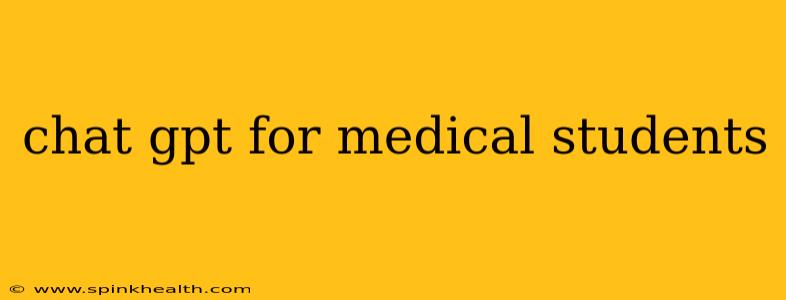The world of medical education is rapidly evolving, and at the forefront of this change is artificial intelligence. ChatGPT, a large language model, is proving to be a powerful tool for medical students, offering a wealth of opportunities for learning, research, and even professional development. But how exactly can this innovative technology benefit aspiring doctors? Let's delve into its multifaceted applications.
How Can ChatGPT Help Medical Students?
My journey into the world of medicine began with endless textbooks and late-night study sessions. The sheer volume of information felt overwhelming at times. I wish I'd had access to a tool like ChatGPT back then! It could have significantly streamlined my learning process. Here’s how:
1. Summarizing Complex Medical Texts:
This is arguably ChatGPT's most valuable function for medical students. Facing dense research papers, lengthy textbook chapters, or intricate case studies? Simply input the text into ChatGPT and request a concise summary. It can extract the key information, saving you countless hours of reading and helping you grasp the core concepts more efficiently.
2. Generating Practice Questions and Explanations:
Preparing for exams can be incredibly stressful. ChatGPT can alleviate this pressure by generating practice questions tailored to specific topics or subjects. Even better, it can provide detailed explanations for each answer, reinforcing your understanding and identifying areas where you might need more work. Think of it as having a personalized tutor available 24/7.
3. Exploring Different Medical Perspectives:
Medicine isn't a black-and-white field. Different approaches and perspectives exist for diagnosis and treatment. ChatGPT can help you explore these nuances by summarizing various viewpoints on a given condition or procedure. This exposure to diverse opinions helps broaden your understanding and fosters critical thinking skills.
4. Improving Medical Writing Skills:
Writing clear and concise medical reports and case studies is crucial. ChatGPT can assist in crafting well-structured documents, suggesting improvements to sentence structure, clarity, and overall flow. It can even help you refine your vocabulary to ensure professional accuracy.
5. Staying Updated on the Latest Medical Advancements:
The medical field is constantly evolving. Keeping up with the latest research can be challenging. ChatGPT can provide summaries of recent publications and breakthroughs, helping you stay informed about new treatments, technologies, and research findings.
What are the Limitations of ChatGPT for Medical Students?
While ChatGPT offers numerous advantages, it's crucial to acknowledge its limitations:
1. Information Accuracy:
ChatGPT is trained on vast amounts of data, but it doesn't possess medical expertise. Always verify information obtained from ChatGPT with reputable medical sources. Never rely solely on ChatGPT for diagnosis or treatment advice.
2. Lack of Clinical Judgment:
ChatGPT cannot replace the experience and clinical judgment of a physician. It's a powerful tool for learning, but it cannot make diagnoses or provide treatment recommendations.
3. Potential for Bias:
Like all AI models, ChatGPT can be susceptible to biases present in its training data. Be aware of this potential and critically evaluate the information it provides.
Conclusion: A Powerful Tool, Not a Replacement
ChatGPT is a revolutionary tool that can significantly enhance the medical student experience. It streamlines learning, improves writing skills, and facilitates research. However, it's crucial to use it responsibly, always verifying information with trusted sources and remembering that it cannot replace human expertise and clinical judgment. Embrace ChatGPT as a valuable learning aid, but never a substitute for proper medical education and mentorship. By leveraging its capabilities wisely, medical students can unlock new levels of learning and prepare themselves for successful careers in the ever-evolving field of medicine.

